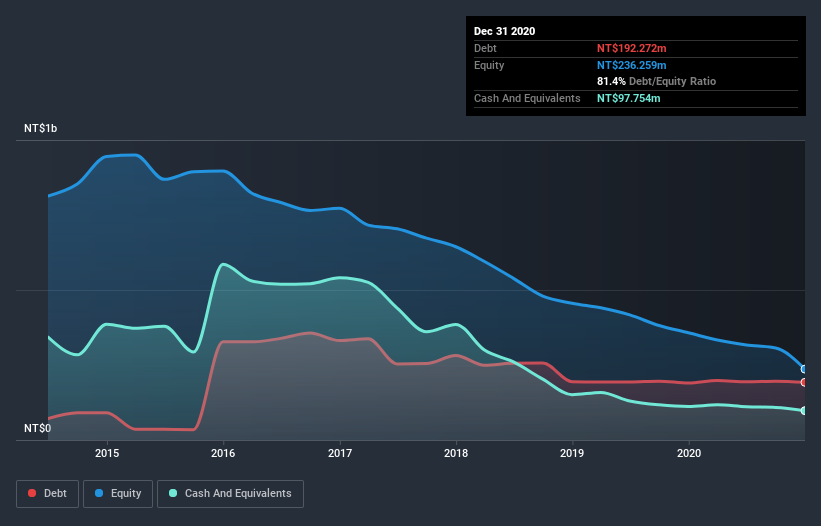Would Cayman Tung Ling (GTSM:2924) Be Better Off With Less Debt?
Warren Buffett famously said, 'Volatility is far from synonymous with risk.' It's only natural to consider a company's balance sheet when you examine how risky it is, since debt is often involved when a business collapses. As with many other companies Cayman Tung Ling Co., Limited (GTSM:2924) makes use of debt. But is this debt a concern to shareholders?
When Is Debt A Problem?
Debt and other liabilities become risky for a business when it cannot easily fulfill those obligations, either with free cash flow or by raising capital at an attractive price. Part and parcel of capitalism is the process of 'creative destruction' where failed businesses are mercilessly liquidated by their bankers. However, a more frequent (but still costly) occurrence is where a company must issue shares at bargain-basement prices, permanently diluting shareholders, just to shore up its balance sheet. By replacing dilution, though, debt can be an extremely good tool for businesses that need capital to invest in growth at high rates of return. The first thing to do when considering how much debt a business uses is to look at its cash and debt together.
See our latest analysis for Cayman Tung Ling
What Is Cayman Tung Ling's Debt?
The chart below, which you can click on for greater detail, shows that Cayman Tung Ling had NT$192.3m in debt in December 2020; about the same as the year before. On the flip side, it has NT$97.8m in cash leading to net debt of about NT$94.5m.

How Strong Is Cayman Tung Ling's Balance Sheet?
We can see from the most recent balance sheet that Cayman Tung Ling had liabilities of NT$260.5m falling due within a year, and liabilities of NT$10.1m due beyond that. Offsetting this, it had NT$97.8m in cash and NT$43.8m in receivables that were due within 12 months. So it has liabilities totalling NT$128.9m more than its cash and near-term receivables, combined.
Cayman Tung Ling has a market capitalization of NT$636.4m, so it could very likely raise cash to ameliorate its balance sheet, if the need arose. However, it is still worthwhile taking a close look at its ability to pay off debt. The balance sheet is clearly the area to focus on when you are analysing debt. But you can't view debt in total isolation; since Cayman Tung Ling will need earnings to service that debt. So when considering debt, it's definitely worth looking at the earnings trend. Click here for an interactive snapshot.
In the last year Cayman Tung Ling had a loss before interest and tax, and actually shrunk its revenue by 33%, to NT$366m. To be frank that doesn't bode well.
Caveat Emptor
While Cayman Tung Ling's falling revenue is about as heartwarming as a wet blanket, arguably its earnings before interest and tax (EBIT) loss is even less appealing. Its EBIT loss was a whopping NT$68m. Considering that alongside the liabilities mentioned above does not give us much confidence that company should be using so much debt. So we think its balance sheet is a little strained, though not beyond repair. However, it doesn't help that it burned through NT$21m of cash over the last year. So suffice it to say we do consider the stock to be risky. When analysing debt levels, the balance sheet is the obvious place to start. However, not all investment risk resides within the balance sheet - far from it. For example, we've discovered 3 warning signs for Cayman Tung Ling (1 is a bit unpleasant!) that you should be aware of before investing here.
When all is said and done, sometimes its easier to focus on companies that don't even need debt. Readers can access a list of growth stocks with zero net debt 100% free, right now.
If you’re looking to trade Cayman Tung Ling, open an account with the lowest-cost* platform trusted by professionals, Interactive Brokers. Their clients from over 200 countries and territories trade stocks, options, futures, forex, bonds and funds worldwide from a single integrated account. Promoted
New: AI Stock Screener & Alerts
Our new AI Stock Screener scans the market every day to uncover opportunities.
• Dividend Powerhouses (3%+ Yield)
• Undervalued Small Caps with Insider Buying
• High growth Tech and AI Companies
Or build your own from over 50 metrics.
This article by Simply Wall St is general in nature. It does not constitute a recommendation to buy or sell any stock, and does not take account of your objectives, or your financial situation. We aim to bring you long-term focused analysis driven by fundamental data. Note that our analysis may not factor in the latest price-sensitive company announcements or qualitative material. Simply Wall St has no position in any stocks mentioned.
*Interactive Brokers Rated Lowest Cost Broker by StockBrokers.com Annual Online Review 2020
Have feedback on this article? Concerned about the content? Get in touch with us directly. Alternatively, email editorial-team (at) simplywallst.com.
About TPEX:2924
Cayman Island Grand Galactica
Researches, develops, manufactures, and sells various baby clothing and supplies in Taiwan and internationally.
Flawless balance sheet with low risk.
Similar Companies
Market Insights
Community Narratives



